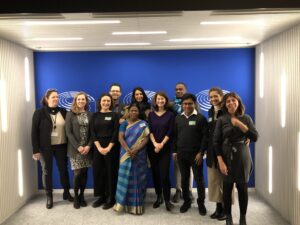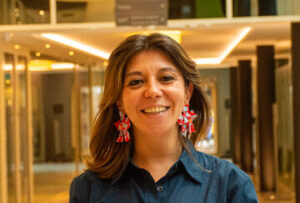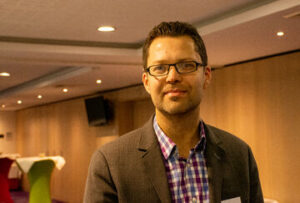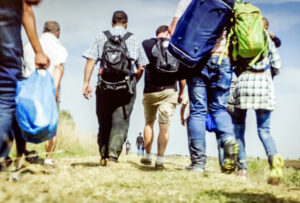We campaign for strong laws that put people before profit, particularly in the EU and UK. Part of this is bringing together activists from around the world so these laws have the global impact we seek. The Global Network Against Forced Labour are nine partners who bring international perspectives into the room with decision-makers. Our Business and Human Rights Policy and Research Officer, Rocio Domingo Ramos, who coordinates the Network, introduces the group and shares how they are working with EU policymakers to influence new laws.

On the 16th of November 2023, the Greens/EFA Group in the European Parliament launched new research that looks at the trickle-down impact of the laws proposed by the EU – mainly the Corporate Sustainability Due Diligence Directive and the Forced Labour regulation. These laws intend to protect people from forced labour around the world, so it is vital to know that these laws will have the intended impact on the people who need them.
- Due diligence. We need laws that will put the onus on businesses to prevent human rights abuses and environmental harm, hold companies accountable when they fail in this duty, and enable victims of abuses to get justice. The EU is currently negotiating the final text of the Corporate Sustainability Due Diligence Directive, which can potentially improve lives globally. It includes key elements we and our partners have been campaigning for. However, it needs to be stronger, and we must make sure the law covers all businesses, including the financial sector, and makes it easier for workers to access justice and bring cases to court.
- Import controls. Alongside due diligence laws, we also need laws that prevents goods made with forced labour from entering the EU. The EU Forced Labour Regulation proposal, if meaningfully designed and implemented, will ban products made with forced labour from being sold in, imported to, or exported from the EU. The proposal must be strengthened to address state-imposed forced labour, such as in Turkmenistan and the Uyghur Region, as well as provide remedy to victims before goods can circulate in the EU market.
The International Labour Organization, International Organisation for Migration and Walk Free estimate that 17.3 million people are in forced labour in the private sector, and 3.9 million people are in state-imposed forced labour, where their government is forcing them to work. We know that one person in forced labour is one too many. Therefore, we need urgent action.
Excitingly, the new research by the Greens/EFA Group shows how powerful the proposed EU legislation could be, having impact across regional borders through the inter-connectivity of value chains. Some of the Network have been involved in the research and highlight that the proposed laws will have the power to transform lives in the EU and far beyond.
Who are the Global Network Against Forced Labour?
People around the world are exploited in forced labour to make goods and provide services sold globally. That’s why we need organisations from around the world to come together into a united global movement to end forced labour in global value chains for exploited people everywhere.
The Global Network Against Forced Labour (also known as NForce) is a network of organisations dedicated to a world where everyone lives in freedom and where rights are respected. Together, they represent people working in nine countries where workers and communities suffer from the negative impacts of EU and UK corporations.
By working together, we can bring everyone’s unique perspectives to decision-makers and learn from each other as we seek every country to have strong laws that put people and the planet before profit.
Nforce: Meet the members
Anti-Slavery International, UK, challenge modern forms of slavery wherever they exist by tackling the root causes of slavery and creating lasting freedom for all.
Astra, Serbia, works to eradicate all forms of modern slavery. They offer direct support to victims, including forced labour in supply chains.
Fundación Libera, Chile, provides training, research and legal representation for victims of modern slavery across Chile and Latin America.
OKUP, Bangladesh, a grassroots migrants’ organisation, focuses on supporting migrant workers and reducing their risk of forced labour for Bangladeshi migrant workers.
Repórter Brasil identifies and publicises cases of exploitative labour and environmental harm in Brazil.
Social Awareness and Voluntary Education (SAVE), based in Tirupur, India, works to end child labour, promote ethical labour standards and empower women and young people in the garment sector.
Turkmen.news, together with local citizens, informs the world about state-imposed forced labour in Turkmenistan and defends human rights by telling governments and significant global human rights organisations about situations of rights violations in the country.
The Uganda Consortium for Corporate Accountability (UCCA) is a coalition of 23 organisations working to hold corporations accountable and protect workers' rights.
Workers’ Rights Watch advocates for workers’ rights in Kenya’s horticultural and agricultural sectors, including the flower export sector.
Why are these perspectives needed?
As the research establishes, EU laws can potentially be powerful tools to address forced labour. But only if they address the problems seen on the ground. By ensuring that global civil society speak directly with decision-makers, we can build the legislation to tackle the issues they see and the solutions they know will work best.
In 2020, we started integrating partners into EU policy and legislative debates related to forced labour in global value chains. As EU debates heated up, in March 2023 we came together for a week of advocacy in Brussels, where they met with policymakers and journalists. They had the chance to advocate for laws strong enough to stop forced labour, including access to justice and the inclusion of financial institutions, both of which we have since seen in the proposals. Since then, some members have also come together in the UK and Spain to meet policymakers.
Watch the video of our advocacy week in Brussels.

Carolina Rudnick, Fundacion Libera, Chile
“We are so grateful and happy to have this experience [the delegation]. We learn from each other. It’s important to know we are not alone. The collective effort strengthens our power. It opens our imagination of what is possible. It’s good to hear both the good and the bad experiences from other organisations. This gives us good examples to try with our own countries. Coming together helps us realise that it is a matter of will and not resources.”

Ruslan Myatiev, Turkmen.News
“The proposed laws in the EU, no matter how strong, will not be enough. It’s important to understand the context of Turkmenistan – it is so controlled that there is no free civil society. We need strong political pressure. The issue of forced labour should always be brought up. Governments are well aware of what is going on in Turkmenistan, but they need to act.”
What’s next for the Network?
As the two legislative proposals in the EU continue to gain momentum and become laws, the Network will be vital to make sure these laws are having the intended impact on workers and communities. We will also continue to advocate for due diligence and import controls in every country, including the UK.
By working together, we can ensure that the laws we campaign for will effectively address the global exploitation workers face daily. And one day soon, we will have a world without forced labour.

Get involved
Join some of the critical work of the Network by calling for a Business, Human Rights and Environment Act here in the United Kingdom, adding your name to our petition.
Add your name now